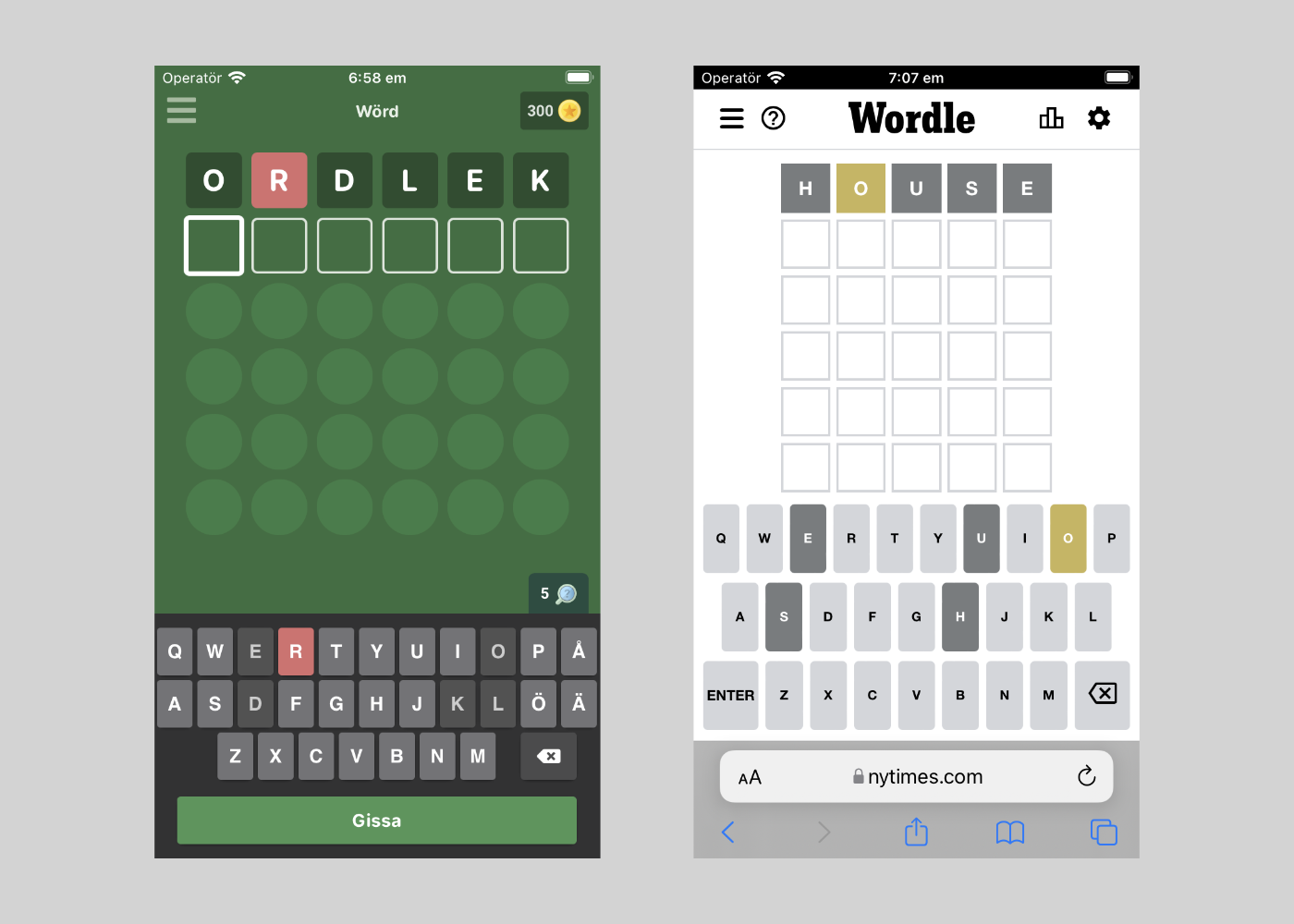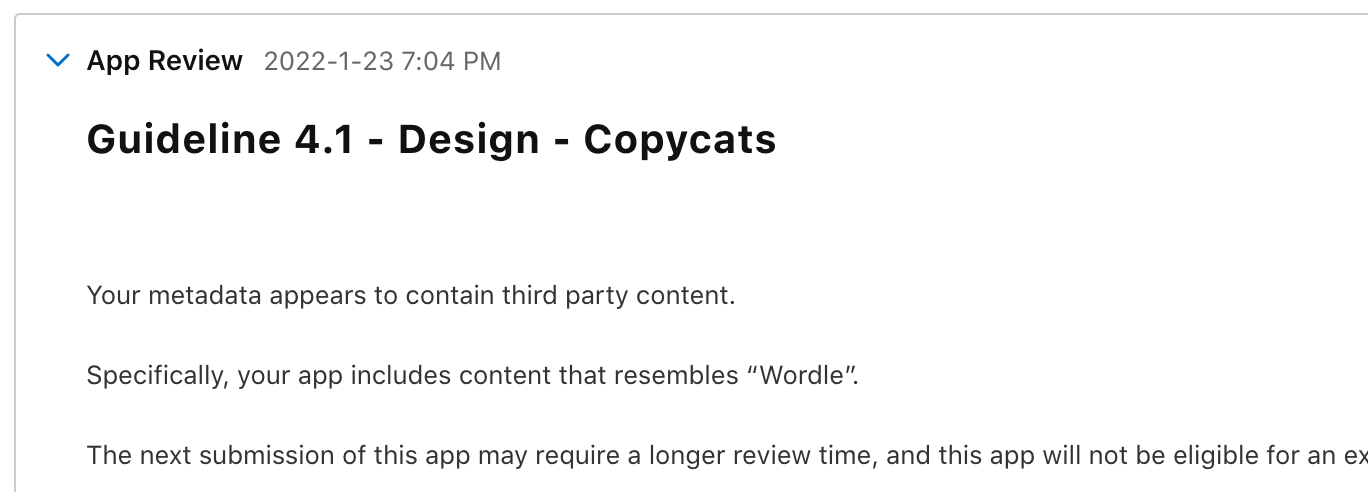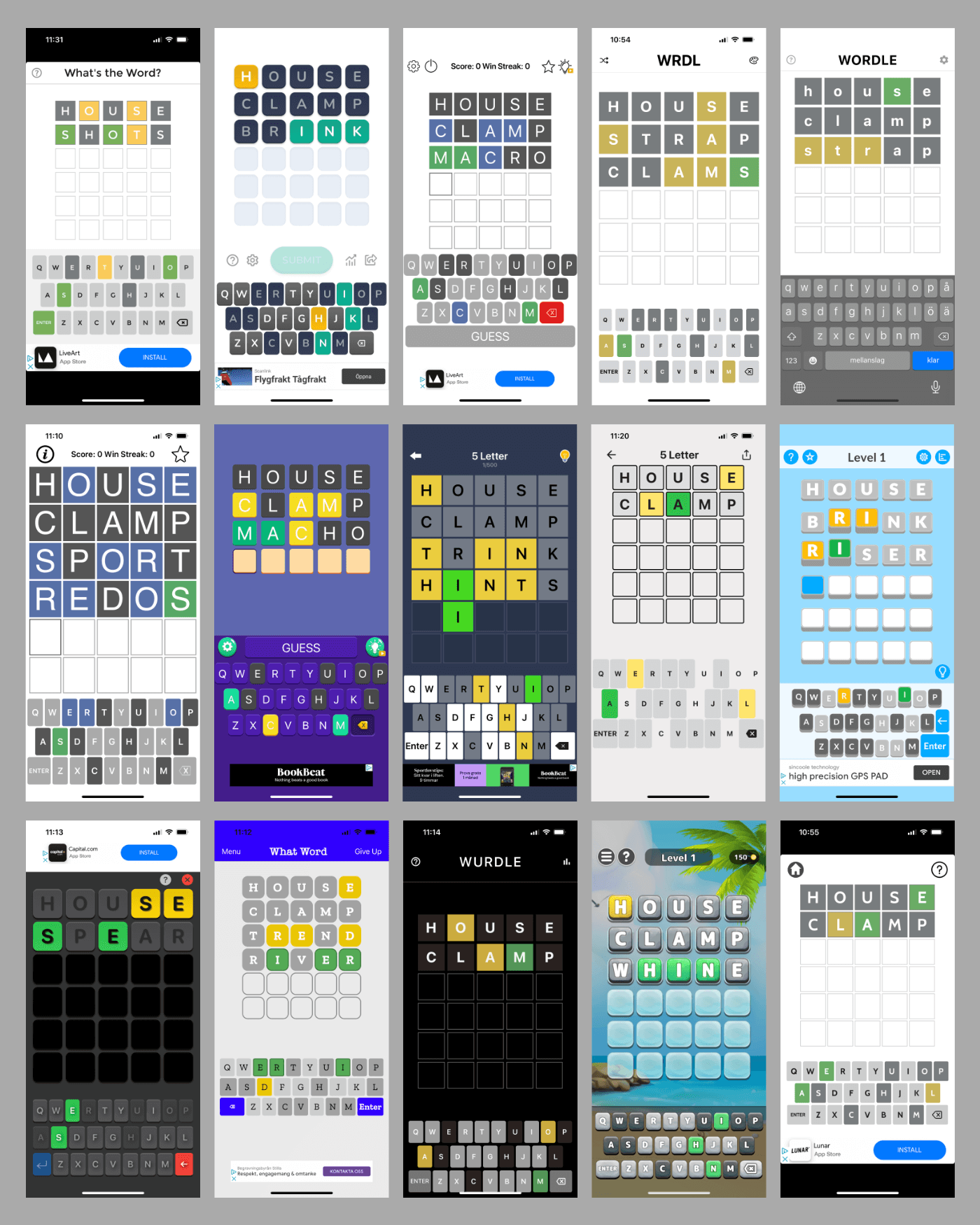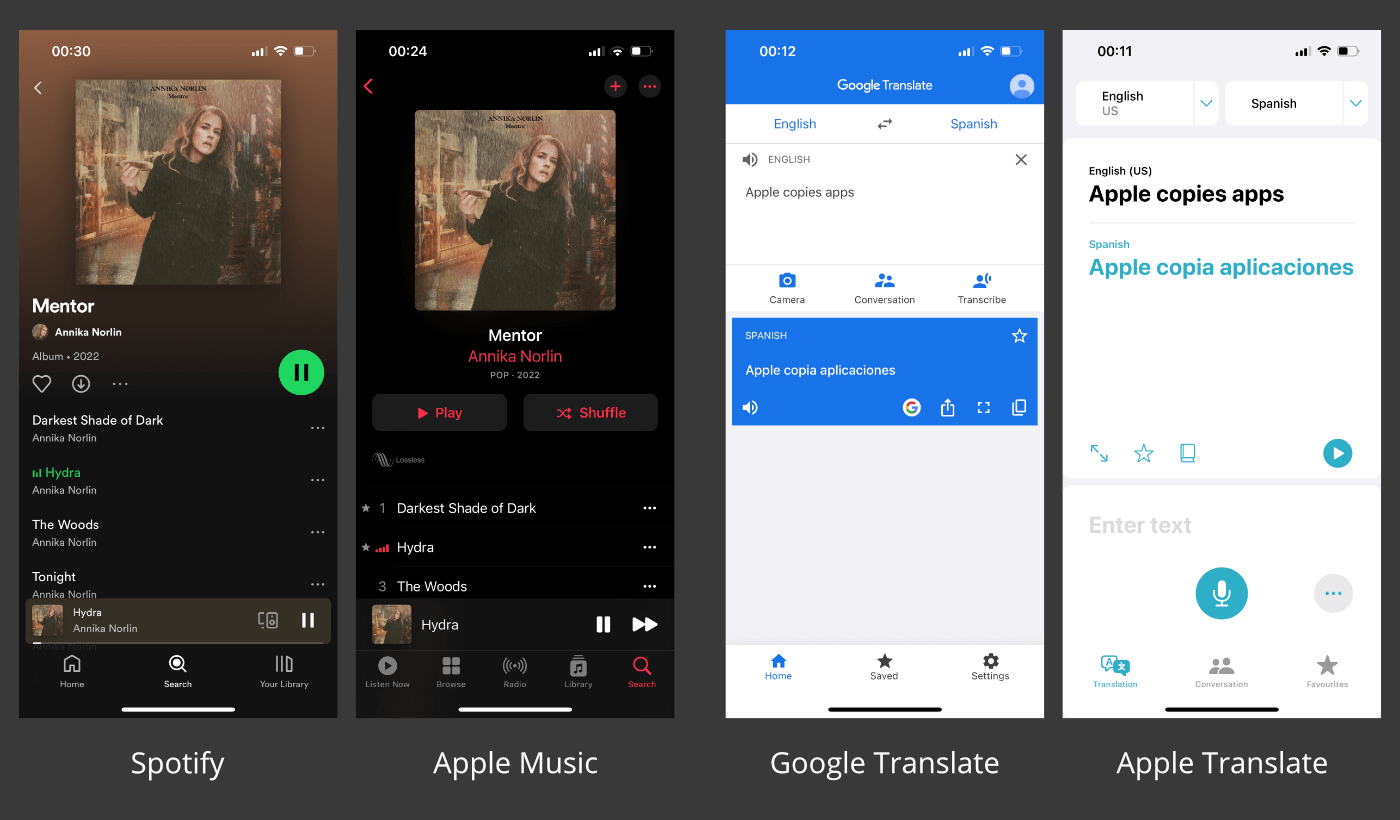Have you ever though about building an iOS app? I did, but I now wish that I hadn’t.
Like many others, I read about Wordle at the end of December last year. Being a word game enthusiast, I found the idea of making the old game show Lingo into a single-player puzzle game brilliant. I enjoyed solving the daily word for a couple of days straight, but I found myself wanting to play more than once a day. Even more importantly, I wanted to play the game in my native language Swedish.
Having recently built a word game for iOS and Android, I figured I could make a Swedish Wordle-style game myself. I searched App Store and could not find any Wordle/Lingo-style games there, so on January 6 I added the first git commit of my game Wörd. I emerged into hackathon mode, and on January 7 I had a working version. Then followed some long days, evenings and nights of coding, making the game look and feel polished.
 Too similar for Apple
Too similar for Apple
On January 11, I finally uploaded the first version to App Store, and on the same day Macrumors wrote an article about the many Wordle clones popping up in App Store. I had already guessed that I wasn’t the only one working on a Lingo-style mobile game, and searches revealed that there still didn’t seem to be any apps with a Swedish dictionary, so I wasn’t surprised or concerned.
Rejections
However, what followed was an endless stream of App Store rejections. I tried to figure out what part of the app Apple found in breach with the App Store Guidelines while submitting new versions with different changes that I hoped would satisfy the Apple reviewer.
At first, I wasn’t that discouraged. I knew submitting apps to Apple was a dreaded task. Although I found it surprising that Apple chose to reject an app due to similarities with a website, my initial design did use similar colors as Wordle.
So I began making many changes to the app that I thought would satisfy the reviewer:
- I removed “wordle” from the app keywords and made sure it wasn’t mentioned anywhere in its description.
- I re-did the design to look different. Was rejected multiple times (I kept making more changes that I hoped would satisfy Apple).
- I built an in-game reward/currency system rewarding the player coins for completing words. Was rejected.
- I implemented clues that the player could use to increase their chance of figuring out the secret word. Was rejected.
- I added a feature where all secret words have a “level code” that can be entered by someone else to play the same word. Was rejected.
- Finally, I decided to drop the English dictionary and translation. I figured if I didn’t even allow users to play the game in English, it would be evident to anyone that my app wasn’t competing with the Wordle website (that only supports English) in any way. They still rejected my app.
All of their rejections basically boiled down to:

During all these changes and submissions, I’ve tried to ask Apple what parts of Wörd it is that they find in breach of the Guidelines. Specifically, I’ve asked them many times if their official policy is to reject all apps implementing the Lingo-style gameplay due to the existence of the Wordle website. They’ve never given me an answer.
At one point, they put me in some kind of in-review-limbo where they themselves put the app “In review” for more than two weeks (without me submitting a new version). During this time when the app was “In review”, it was not possible to communicate with the reviewer.
Appeal
As a last resort, I submitted an appeal to Apple’s review board, hoping that I had just run into a bad apple reviewer (pun intended). In the appeal, I tried to emphasize the fact that Wörd is in Swedish, uses a Swedish dictionary, and that you can play more than one game per day. Things that make it very different from Wordle. For a non-English-speaking person, Wordle is unplayable. Even for me, who speaks English reasonably well, playing the game in my native language is so much more enjoyable.
Here’s my appeal in full (it’s pretty long):
Read more# Background I’ve made the Swedish word game “Wörd” that is based on the same basic game mechanic popularized by the TV show Lingo ( https://en.wikipedia.org/wiki/Lingo_(American_game_show) ) that first premiered in 1987 and has had many international counterparts throughout the years. This game mechanic is in turn inspired by the even older game Jotto (https://en.wikipedia.org/wiki/Jotto) from the 1950th. Another game that is based on the same core game mechanic is the website Wordle ( https://www.powerlanguage.co.uk/wordle/ ) and that website has grown hugely popular in English speaking countries recently. My app has been getting rejected with the reason stated that it resembles the website Wordle (“Guideline 4.1 - Design - Copycats”). I’ve tried to work with the App Reviewer through the resolutions center for multiple weeks. Asking for clarifications, submitting multiple app updates with design changes, in order to get the game approved. However, the changes I’ve made have not been able to satisfy the reviewer. I haven’t been able to get answers to my questions regarding clarifications, and my arguments for why I think my app complies with the Review Guidelines have been ignored. Therefore, I see no other recourse than to write this appeal, since I believe my app is in compliance with the Guidelines. # What unique feature Wörd brings to the App Store Apart from having a very different set of features compared to the Wordle website (see the list of similarities and differences below), Wörd has a couple of main characteristics that makes it hugely different from the website. 1. Wörd is played with a Swedish dictionary. For non-English speaking persons, the Wordle website is unplayable. Even for people like me who speak English reasonably well, the experience of playing a word game is so much more enjoyable in my native language. I assume a dictionary app wouldn’t get rejected as a copycat just because a different dictionary app exists for another language? 2. In Wörd, you can play multiple games per day. One characteristic of the Wordle website is the fact that one can only play a single word per day. While this is probably appreciated by many of their players, there are definitely people who would like to be able to enjoy a game, implementing the Lingo game mechanic, for more than five minutes per day. While it might be a cool idea, I would consider a camera app that only allowed you to snap a single photo per day, very different from a camera app that allowed you to take an unlimited number of photos per day. 3. The fact that it’s an app and not a website. Wörd uses haptic feedback to enhance the game experience, and lets the user schedule reminders. Features that are simply not possible for a website. # Similarities and differences between Wörd and the wordle website Both my game and the wordle website uses the core game mechanic of the Lingo game show ( https://en.wikipedia.org/wiki/Lingo_(American_game_show) ) from the eighties, and both games have been inspired by the game board UI of Lingo. Both my app and the Wordle website also use a keyboard at the bottom of the screen to let the user input letters. The keyboards have different layouts, but they both color the key buttons according to the current game state simply because it provides an obviously better user experience for the player. But that’s where the similarities stop. Here is a list of differences between my game and the Wordle website: * Different looking design, as well as differences when interacting with the "board" (in Wörd you don't have to enter the word letter by letter, since you can tap on any letter to select them and possibly change them). While the game board structure is very similar (both games are inspired by Lingo), the design looks very different and there is no chance of anyone mistaking one for the other. * As mentioned above, Wörd is in Swedish and is played with a Swedish dictionary. The Wordle website is unplayable for people who don’t speak English. * In Wörd you can play games with words of multiple different lengths (compared to only five-letter words on the Wordle website). * In Wörd, you can play multiple games per day, whereas the website Wordle only lets you play a single game per day * Wörd has an in-game currency that players get rewarded when solving words, and can be used to buy additional attempts. * In Wörd you can earn, buy and use clues to help you solve the puzzles. * Wörd has a no-spoiler mode that you can use to show your result to friends without spoiling the secret word. * Each level in Wörd has a level code that you can share with your friends to let them play the same level as you. * Wörd lets you schedule reminders to not miss the daily word. # Regarding “Guideline 4.3 - Design” My last two submissions were also labeled as being considered spam since I have two apps in my account with very similar content. The reason for this - as I’ve also informed the reviewer through the resolutions center - was that I decided to change the primary language of the app to Swedish, which is not supported in the App Store Connect portal. I also wanted to keep the Resolution Center discussion history. I have no intentions of ever publishing both apps, and assuming “Wörd” gets approved, I intend to remove the other app (ID: ##########) immediately. However, since I have no intention of ever publishing the other app, I also went in and removed “Sweden” as a region from it so that there is no region overlap between the two apps. I mentioned this to the reviewer through the Resolutions Center, but this seems to have been missed since “Guideline 4.3 - Design” was still mentioned in the rejection for the last submission. # Summary I hope you give my appeal a fair consideration, and obviously I hope you agree that Wörd brings something unique to the App Store by letting non-native English speaking persons enjoy Lingo-style gameplay for more than 5 minutes per day. If you don’t agree, I would really appreciate it if you could let me know if your current stance is that you will reject all apps that implement the basic game mechanic of Lingo due to the existence of the Wordle website? And if that is not the case, what part of Wörd is it that you think are in breach with the design guidelines?
They rejected my appeal without giving me any more information:

Double standards
During this whole process (more than a month), new Lingo-style apps have been popping up in App Store almost daily. Most of these apps are in English, and many resemble the Wordle website much more than Wörd does. When I’ve pointed this out to Apple, I’ve only gotten the answer that I’m free to “report” these apps if I believe they don’t follow the Guidelines. I don’t think these apps breach the Guidelines, but I guess Apple intentionally chooses to misinterpret me.
 Approved by Apple
Approved by Apple
Most of these apps were published after I submitted Wörd. And these are just the first 15 I found when searching for “wordle” in App Store. There are many more. How can Apple - a trillion-dollar company - apply their intentionally fuzzy Guidelines so differently for different apps?
Using Apple’s logic, there shouldn’t exist any Minesweeper app on App Store, since they are all copycat apps of the original Windows game (and in case Apple don’t count Windows programs, web implementations exists). However, a quick search in App Store reveals:

Surely most people would agree that some of these apps “resemble” each other?
It’s possible to compile similar galleries for games like Scrabble, Boggle, Tetris, Breakout, Hangman, and the list goes on and on.
What’s even less surprising is how (little) Apple apply their Guidelines when it comes to their own apps:
 Seeing any resemblance here?
Seeing any resemblance here?
These are just two current examples. Apple has copied many more apps before. In a statement issued by Apple, they say that “The App Store has a uniform set of guidelines, equally applicable to all developers, that are meant to protect users”. Ha - that’s nothing but Orwellian newspeak.
I’m not arguing that Apple shouldn’t be allowed to copy apps and features - that’s how innovation happens. The fact that there are hundreds of different Minesweeper apps in the store makes it more likely that I can find one which accurately meets my preferences. What’s outrageous is that they use “resemblance” with another app (or actually, website) to reject my app while pretending that they apply their guidelines equally to all developers.
But it’s Apple’s store so they can do whatever they want with it!
They can, but they shouldn’t be allowed. Apple not allowing any competing stores gives them a de facto monopoly. A monopoly which they use every day to crush competitors, extort businesses and limit competition.
In the US, Apple currently has 60% of the mobile device market. Remember when Microsoft was fined $731,000,000 for shipping Internet Explorer as the default Windows web browser? What’s that compared to what Apple is pulling with their App Store monopoly? Heck, Apple doesn’t even allow any other browser renderers than Safari on iOS.
But even if you disagree with me, and you think that Apple should be allowed to be the only gatekeeper to 60% of people’s mobile devices. Surely you still agree that Apple should apply their rules consistently? In this case that would mean either allowing Wörd on the store, or purging all apps that resemble other apps from App Store. Starting with their own Apple Music and Translate apps.
As a developer, stay away from the App Store
It’s not fun having poured many days and nights of hard work into creating something, only to have it crushed by an erratic gatekeeper. But in the end, I get that this specific case mainly just concerns me. A casual word game less in App Store is entirely insignificant to the average user. However, if you’re a developer, my advice is to avoid the App Store. Avoid it like the plague.
Of course, for many developers this isn’t an option (that’s the thing with monopolies). You might be building a service like Hey.com, Trello, or Spotify, where not having an iPhone app simply isn’t a viable option if you want to stay in business.
However, if you do have the luxury to choose what projects to pursue, and what platforms to build for, stay away from Apple. I have this luxury, and I wish someone would have told me one and a half months ago.
Commments